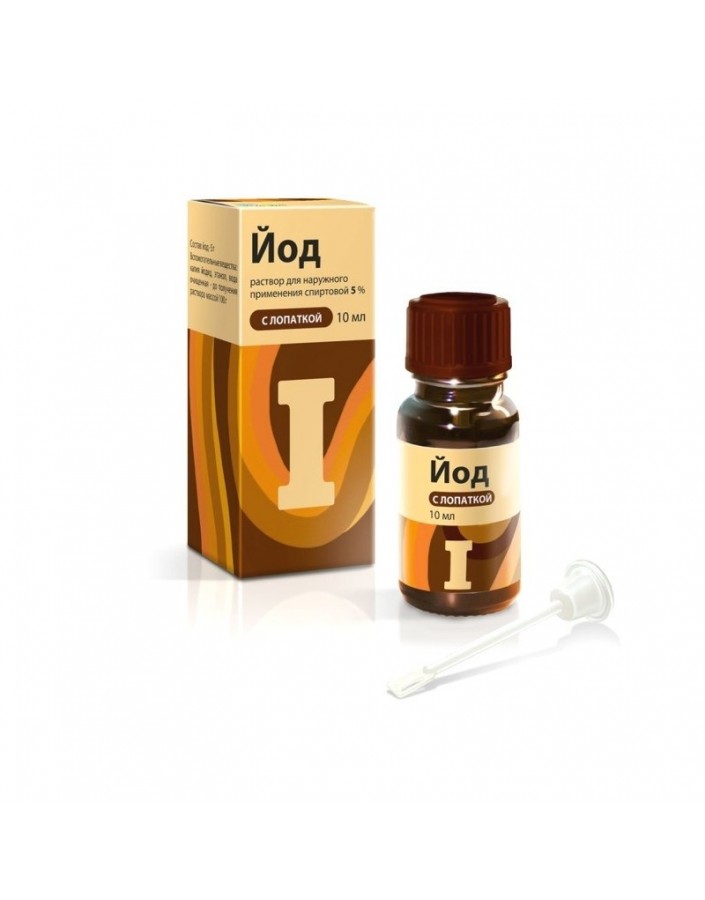




Security policy (edit with Customer reassurance module)

Delivery policy (edit with Customer reassurance module)

Return policy (edit with Customer reassurance module)
Alcohol Iodine solution
10 ml
Iodine has strong antimicrobial properties. For preparations of elemental iodine, a pronounced local irritating effect on tissue is typical, and in high concentrations - a cauterizing effect. Local action is due to the ability of elemental iodine to precipitate tissue proteins. Drugs that cleave off elemental iodine have a much less pronounced irritant effect, and iodides have local irritating properties only in very high concentrations.
The nature of the resorptive action of drugs of elemental iodine and iodides is the same. The most pronounced effect of the resorptive effect of iodine preparations on the function of the thyroid gland. When iodine deficiency iodides contribute to the restoration of impaired synthesis of thyroid hormones. With a normal iodine content in the environment, iodides inhibit the synthesis of thyroid hormones, the sensitivity of the thyroid gland to the TSH of the pituitary gland decreases and its secretion by the pituitary gland is blocked. The effect of iodine preparations on the metabolism is manifested by increased dissimilation processes. In atherosclerosis, they cause a slight decrease in the concentration of cholesterol and beta-lipoproteins in the blood; Besides,increase the fibrinolytic and lipoproteinase activity of the blood serum and slow down the rate of blood coagulation.
Accumulating in syphilitic gums, iodine contributes to their softening and resorption. However, the accumulation of iodine in the tuberculous foci leads to an increase in the inflammatory process in them. Excretion of iodine by the excretory glands is accompanied by irritation of the glandular tissue and increased secretion. In this regard, iodine preparations have an expectorant effect and stimulate lactation (in small doses). However, in large doses, they can cause lactation inhibition.
For external use: infectious-inflammatory skin lesions, injuries, wounds, myalgia.
For local use: chronic tonsillitis, atrophic rhinitis, purulent otitis, trophic and varicose ulcers, wounds, infected burns, fresh thermal and chemical burns of the I-II degree.
For oral administration: prevention and treatment of atherosclerosis, tertiary syphilis.
Hypersensitivity to iodine. For oral administration - pulmonary tuberculosis, nephritis, nephrosis, adenomas (including thyroid gland), furunculosis, acne, chronic pyoderma, hemorrhagic diathesis, urticaria, pregnancy, children up to 5 years of age.
When applied topically, iodine treats damaged skin.
For oral administration, the dose is set individually, depending on the evidence and the age of the patient.
For topical application, it is used for washing lacunae and supra-tonsillar spaces - 4-5 procedures at intervals of 2-3 days, for irrigation of the nasopharynx - 2-3 times a week for 2-3 months, for instillation in the ear and washing - for 2 - 4 weeks; in surgical practice and in case of burns, gauze wipes are applied to the affected surface as needed.
When applied topically: rarely - skin irritation. When taken orally: skin allergic reactions, tachycardia, nervousness, sleep disturbances, excessive sweating, diarrhea (in patients older than 40 years).
In the dark place at a temperature of no higher than 25 ° C.